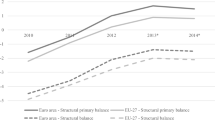Abstract
With the 2005 reform of the Stability and Growth Pact, a commitment was made to actively consolidate public finances in good times and to use unexpected extra revenues for deficit and debt reduction and not for additional expenditure. Against this background this study provides evidence of a lax implementation of expenditure plans in recent years when revenues were buoyant. Moreover, the influence of revenue windfalls on expenditure overruns is found to be more pronounced in countries that also have not met their medium-term objectives. Thus, first experiences in implementing the provisions of the preventive arm of the Stability and Growth Pact after its reform are not encouraging.
Similar content being viewed by others
Author information
Authors and Affiliations
Additional information
The views expressed in this article are those of the authors and do not necessarily reflect those of the Deutsche Bundesbank. The authors would like to thank especially Bernhard Manzke and Karsten Wendorff, as well as Lukas Reiss and other members of the ESCB Working Group on Public Finances for many helpful comments.
Rights and permissions
About this article
Cite this article
Lemmer, A., Stegarescu, D. Revenue windfalls and expenditure slippages: Disappointing implementation of the reformed stability and growth pact. Intereconomics 44, 159–165 (2009). https://doi.org/10.1007/s10272-009-0291-1
Published:
Issue Date:
DOI: https://doi.org/10.1007/s10272-009-0291-1




